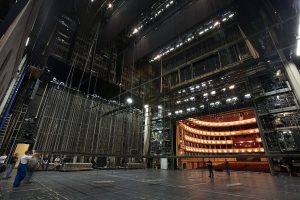
A Praxeography of the Theatre Apparatus
Research project, funded by ![]()
Principal investigator: Prof Dr. Ulf Otto
Research assistants: Luise Barsch, M.A., Anna Raisich, M.A.
2022-2025 (Ludwig-Maximilians-University Munich)
Research blog @ hypothesis
Theatre has traditionally been seen as an essentially social art and in recent years has increasingly come under the microsociological and macrosociological spotlight. However, the socio-technical dimension of theatre has received little attention so far. For it is precisely the trades and operations, thanks to which aesthetic processes in theatre are essentially intertwined with material culture and technical infrastructure, that remain degraded to subordinate tools within the framework of a hylomorphistic concept of art that categorically separates art from technology, and which have so far hardly been capable of satisfying art studies. The project therefore aims at a theoretical rehabilitation of theatre as apparatus through an empirical investigation of practices of production, and thus not least of the people, machines and materials in the trades. In three closely linked sub-projects, the art of theatre is observed in everyday operations, in precisely those places and activities in which it is not usually situated: (a) in the production of objects in the workshops, (b) in the management of resources in the operations offices, (c) in the coordination of processes in the technical rooms. Following the things, bodies and signs that pass through these places, tracing their paths, as well as the changes and entanglements they undergo along the way, the project asks about the indissoluble interconnection of the semiotic, the material and the social in the articulation of aesthetic propositions – at precisely those points where they are exposed to change through technological upheavals. This is connected to an epistemic change of perspective from the auditorium to the backstage of the theatre, which methodically approaches procedures of cultural anthropology, but closely links them to a historical and theoretical perspective. The decisive point of reference is therefore less (European) ethnography and more a praxeography in the sense of Annemarie Mol, whose empirical philosophy is in the tradition of actor-network theory (Latour) and (feminist) science and technology studies (Haraway). In this way, the project aims not least at a decentering of the concept of performance and the theatre-scientific formulation of a concept of posthuman performativity (Barad), which is interdisciplinary, reacts to recent upheavals and designs a new materialism of the performative.